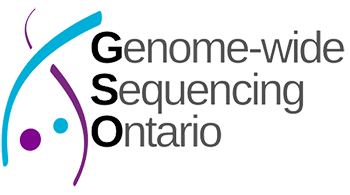The CHEO Genetics Diagnostic Laboratory (GDL) and SickKids Genome Diagnostics Laboratory (GDL) teams wanted to reach out to share two updates on genome-wide sequencing (GWS) in Ontario:
Genome sequencing quality improvement pilot
From April 1, 2021, to March 31, 2023, GWS was performed for 724 trios (proband plus two parents) via a randomization pilot between exome sequencing (ES) and (GS). Preliminary analyses did not find a statistically significant difference in the diagnostic yield between exome sequencing (ES) and genome sequencing (GS). However, GS demonstrated additional diagnostic utility in certain circumstances (i.e., identification of intronic variants and small copy number variants). The GSO pilot demonstrated the equivalence of ES and GS for identifying coding variants when offered as a second-tier test after chromosomal microarray. Since April 1, 2023, clinical GWS in the form of ES has been publicly funded through the Ontario Health Provincial Genetics Program and provided by CHEO and SickKids GDLs. The funding of GWS using ES was based on the outcomes of the GSO implementation pilot.
We hypothesize that the true potential of GS was not fully realized during the pilot due, in part, to the positioning of GS in the diagnostic care pathway. To further investigate the diagnostic power and cost effectiveness of GS, CHEO and SickKids will be launching a new 1-year clinical genome sequencing quality improvement pilot on October 1st, 2023. Based on an assessment of provincially administered GWS outcomes to date and available institutional funding, the following considerations have been made for a new pilot of GS in the rare disease diagnostic pathway as part of a quality improvement pilot:
-
- Clinical GWS availability:
- Clinical GWS in the form of genome sequencing will be automatically initiated for probands undergoing trio sequencing in which all samples have been received at the CHEO or SickKids laboratories on or after October 1st, 2023, and who fall under the following criteria:
- <2 years of age at date of sample receipt, or;
- Regardless of age, the proband has not had genetic testing for the purpose of diagnosis (including molecular (panel) and cytogenetic (microarray) testing or
- More than five years prior, the proband received clinical exome sequencing, which was not diagnostic
- Test methodology (ES or GS) will continue to be clearly indicated on the reports issued by the CHEO and SickKids laboratories
- All individuals who fall outside of these categories will receive standard of care clinical ES
- The clinical and management eligibility criteria for GWS are unchanged.
- A laboratory turn-around time of ≤12 weeks will be maintained for both ES and GS testing
- Clinical GWS in the form of genome sequencing will be automatically initiated for probands undergoing trio sequencing in which all samples have been received at the CHEO or SickKids laboratories on or after October 1st, 2023, and who fall under the following criteria:
- Microarray:
- When clinically indicated, microarray testing should continue to be ordered for all patients receiving ES or GS during the quality improvement pilot period. In other words, patients eligible for GS should have microarray ordered at the same time.
- Reportable variant types
- In addition to single nucleotide variants and copy number variants, reportable variant types through GS may include mitochondrial DNA variants, repeat expansions, and structural variants.
- Monitoring and Quality Improvement:
- The CHEO and SickKids teams will conduct a quality improvement project to assess the efficiency and utility of GWS for RD patients performed on different technologies, ES or GS. This will help track the performance and efficiency of GS as it matures in the diagnostic care pathway.
- Funding:
- CHEO and SickKids have allocated funds from their own institutions to support the additional costs of GS as well as the quality improvement work.
- Clinical GWS availability:
By implementing GS for selected patient groups and optimizing the diagnostic pathway, Ontario patients with RDs may benefit from the increased diagnostic power and efficiency offered by GS. Continued quality improvement and evaluation is essential in making informed decisions on the funding and integration of GS into the healthcare system based on real-world data.
Please reach out to either gso@cheo.on.ca or gso.requests@sickkids.ca should you have concerns about a patient receiving GS rather than ES.
Secondary Findings
As of October 1, 2023, we will be adopting the updated list of genes for secondary findings, as recommended by the American College of Medical Genetics and Genomics (ACMG SF v3.2, Miller et al. 2023, PMID: 37347242).
-
- Our revised list of medically actionable in childhood secondary findings genes will consist of 71 genes (excludes BRCA1, BRCA2, MLH1, MSH2, MSH6, PMS2, MUTYH, PALB2, HFE, and TTR).
- All 81 recommended genes will be included in the full list of secondary findings genes
More information about our updated secondary finding options will be available at www.gsontario.ca on September 27th, 2023.
Similar to previous updates to the secondary finding list, the secondary findings gene list version used for each patient (and their family members) will be determined by the date of receipt of the sample and requisition at the SickKids or CHEO laboratories (i.e. if a family is consented prior to October 1st 2023, but their sample arrives at the lab on or after October 1st, the secondary findings analysis undertaken will reflect the updated list).
You will receive a fax or email notifying you of this change. If you have concerns about the addition of the new genes for a particular patient’s analysis, we ask that you please contact us to discuss alternative options, at gso@cheo.on.ca (CHEO) or gso.requests@sickkids.ca (SickKids).

